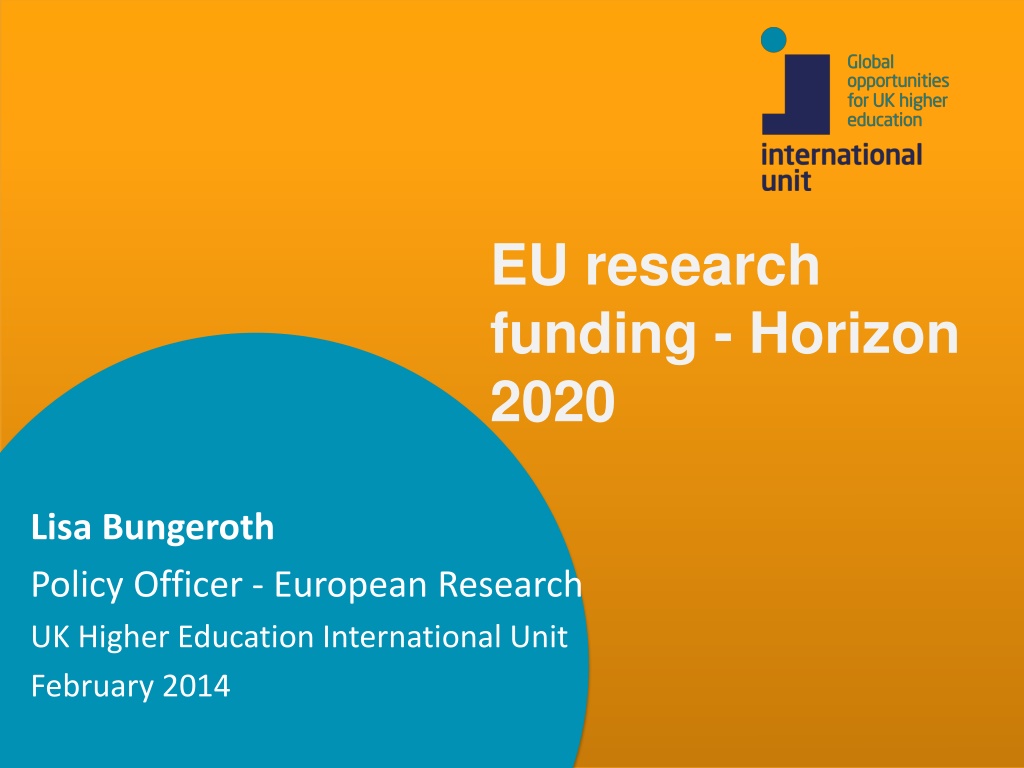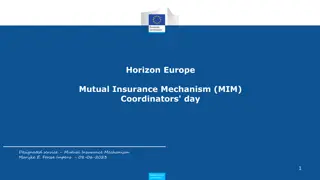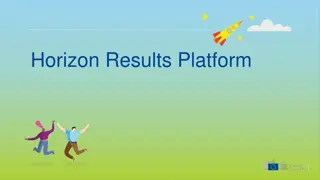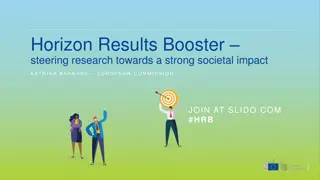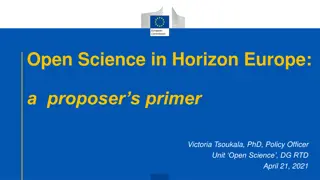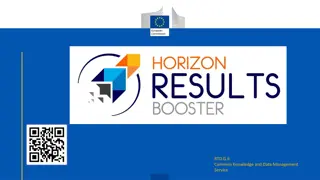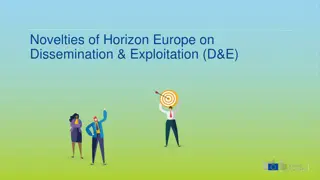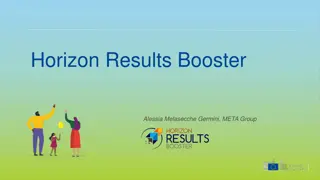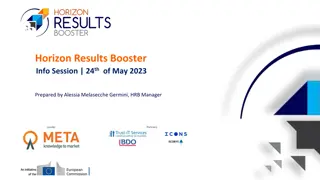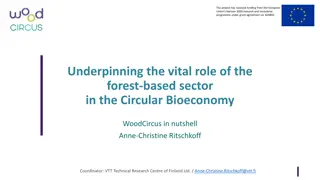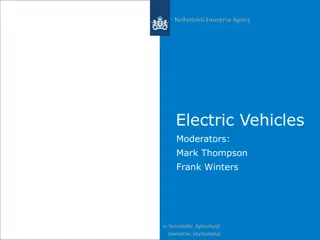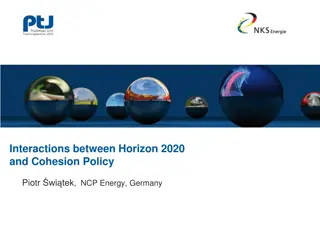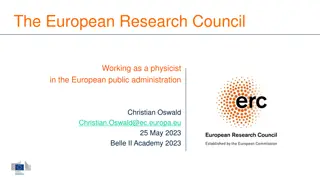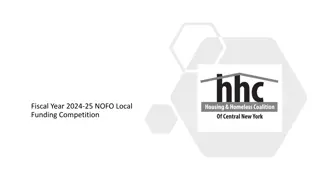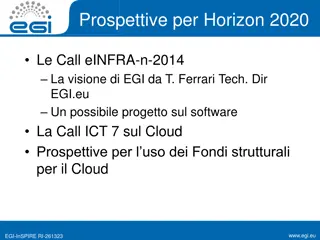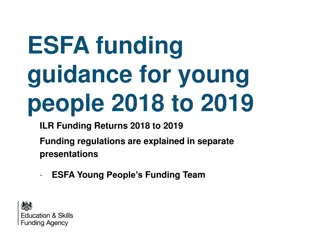Understanding EU Research Funding: Horizon 2020 Overview
Horizon 2020 is the EU's primary funding program for research and innovation, spanning from 2014 to 2020. It caters to academia, research, industry, and various stakeholders on a larger scale, supporting diverse projects and initiatives. The UK Higher Education International Unit plays a significant role in policy support, engaging with governments and representing the sector in international dialogues and collaborations.
Download Presentation

Please find below an Image/Link to download the presentation.
The content on the website is provided AS IS for your information and personal use only. It may not be sold, licensed, or shared on other websites without obtaining consent from the author. Download presentation by click this link. If you encounter any issues during the download, it is possible that the publisher has removed the file from their server.
E N D
Presentation Transcript
EU research funding - Horizon 2020 Lisa Bungeroth Policy Officer - European Research UK Higher Education International Unit February 2014
Overview UK HE International Unit who we are and what we do EU research funding Horizon 2020 et al Basics EU policy context UK positions and IU/UUK engagement Health in Horizon 2020 How to get involved
Universities UK (UUK) and the UK HE International Unit (IU) IU represents the whole of the sector IU delivers international and European policy for UUK IU and UUK working closely together over the whole course of the budget and programme negotiations
UK HE International Unit Policy Programmes: HEGlobal Phase 2: TNE information service Scholarship schemes: SwB Brazil, Dikti Indonesia Outward student mobility Improving existing schemes: Conacyt Mexico Government delegations: Kazakhstan, China, Colombia, Australia, Indonesia IU delegations: Lybia, Myanmar, Chile and Argentina Country engagement: Syria, Turkey
UK Higher Education International Unit Policy Supporting UK Government Priorities, strategy Representing the sector delegations Dialogue with other Governments UKIERI, UK China PIE, Malaysia, Turkey, Saudi Arabia Influence European Union decision-makers: Horizon 2020, Erasmus+, Bologna Process, EU legislation affecting HE and research European University Association, UKRO, Science Europe,
EU Research Funding Horizon 2020 and non Horizon 2020 funding Multilateral research networks Joint Technology Initiatives Joint Programming Initiatives Article 185 Initiatives European Innovation Partnerships European Structural and Investment Funds
Horizon 2020 - Basics Horizon 2020 is the EU s main funding programme for research and innovation and will run from 2014 to 2020 funding programme for all types of actors involved in research and innovation academia, research, industry and other stakeholder organisations Horizon 2020 represents EU funding for research and innovation on a larger scale no funding for occasional travel for research meetings, or smaller stand-alone conferences or workshops Increasingly competitive
Horizon 2020 - Basics Collaborative Project (CP) most common: minimum of three participants from three different EU Member States or countries that are associated to Horizon 2020 (NOR, IL, IC, CH?) fund research activities including personnel costs, travel, consumables, management costs and dissemination Co-ordination and Support Actions (CSAs): do not fund research as such but fund, for example, the co-ordination of research policies across Member States in a particular field A small or medium-scale Collaborative Project would usually last 2-4 years, and larger projects could run for 3-5 years Funding mainly based on the reimbursement of actual direct costs incurred for a project plus flatrate for indirect costs
Horizon 2020 Policy context Horizon 2020
Horizon 2020 - Background Commission Proposals November 2011 Competitiveness Council Partial General Approaches on main legislative texts (excluding Budget) - Autumn 2012 EP ITRE Committee adopted its report - Autumn 2012 Trialogue meetings between the Irish Presidency, the Council of the EU and the EP from January June 2013 informal agreement in June Final adoption in EP plenary and Council: November/December 2013 Development of work programmes: Autumn 2013 First calls for proposals: December 2013 Formal launch of Horizon 2020: 1 January 2014 UK launch: 31 January 2014
Main issues in negotiations Budget Commission proposal: 80bn (in constant 2011 prices) Final figure in negotiations: 70.2bn (in constant 2011 prices) 79bn adjusted for inflation Programme Single funding rate vs full cost Horizon 2020 architecture SME support
IU and UUK engagement Extensive briefing of MPs and a letter to David Willetts prior to the November 2012 Summit first budget negotiation Joint letter with the German Rectors Conference (HRK) to Prime Minister David Cameron and Chancellor Angela Merkel prior to the February 2013 Summit second budget negotiation
IU and UUK engagement High-level delegation in May 2013 Letter to MEPs about effective and sustainable investment in research and FEC option in June 2013 Ongoing Officer engagement in Brussels Feeding in to BIS Influencing work programmes 13
Horizon 2020 and UK position Overall, Horizon 2020 is well-aligned with the UK position: Excellence is main funding criterion Support across the innovation spectrum Focus on societal challenges (ageing population, food security, climate action etc) Enhanced support for European Research Council Focus on cross-cutting technologies (ICT, nano, bio) Mainstreaming of social sciences and humanities Radical simplification (less paperwork, audit burden reduced, shorter time to grant etc)
Policy context: EU research funding in the UK In FP7 so far, the UK has received 6.1bn - 15.4% of the total FP7 funding only Germany has received more funding UK most successful MS in European Research Council and the Marie Curie Actions The UK is involved in more successful projects than either France or Germany Access to large, transnational, multi-disciplinary projects as well as to established collaborative networks increase research impact Pooling resources for large infrastructures
Policy context: EU research funding in the UK
EU Research Funding - Health H2020 Societal Challenge 1: Health, demographic change and wellbeing Societal Challenge 2: areas relating to health and food; Societal Challenge 6: health-related topics within the social sciences and humanities; Societal Challenge 7: health aspects related to crises management and disaster resilience Pillar 2: Leadership in Industrial and Enabling Technologies (LEIT) in the field of advanced materials and nanotechnology related to health
Health topics across H2020 The Leadership in Industrial and Enabling Technologies Societal Challenge - 2 Societal Challenge - 6 Societal Challenge - 7 1. Scale-up of nanomedicine production Networking of SMEs in the nano-biomedical sector Biomaterials for the treatment of diabetes mellitus Nanomedicine therapy for cancer Biomaterials for treatment and prevention of Alzheimer s diseases 1. Assessing the health risks of combined human exposure to multiple food-related toxic substances Improving the control of infectious epidemics and foodborne outbreaks through rapid identification of pathogens Tackling malnutrition in the elderly 1. Always more inequalities? New views on equality, solidarity and democracy 2. Early job insecurity and labour market exclusion 3. Youth mobility: opportunities, impacts, policies 4. Inclusive and sustainable urban planning for a modern society 1. Feasibility study for strengthening capacity-building and security protection in case of large-scale pandemics Crises and disaster resilience operationalizing resilience concepts 2. 2. 3. 2. 4. 5. 3.
EU Research Funding - Health Non-H2020 EU Health for Growth Programme (DG SANCO) nursing, midwifery and the allied health professions more directly included here WP expected for March Multilateral research networks Ambient Assisted Living joint programme Joint Programming Initiative More Years, Better Lives JPI on Neurodegenerative Diseases JPI on Antimicrobial Resistance JTI: Innovative Medicines Initiative 2 (IMI) Article 185: European and Developing Country Clinical Trials Partnership (EDCTP) Active and Healthy Aging European Innovation Partnership
Main differences FP7 to H2020 Simplification single reimbursement rate, shorter time to grant etc. H2020 is a research and innovation programme, and not just research as in FP7 (integration of FP, EIT, CIP under one programme) New instruments such as Fast Track to Innovation Call topics more open/ less prescriptive Challenge-based Pillar 3
How to get involved Publication of work programmes and calls for proposals: Work programmes explain what is funded and what is expected from project in terms of policy impact Calls for proposals give details on the eligibility criteria and the timeline (deadline, evaluation, results) Horizon 2020 Participant Portal http://ec.europa.eu/research/participants/portal/desktop/en/home.html
How to get involved Expert Advisory Groups Call for expressions of interest is still ongoing (first groups have been selected) http://ec.europa.eu/research/horizon2020/index_en.cfm?pg=h2020- experts 15 groups, consisting of 20-30 experts EU evaluators database (http://ec.europa.eu/research/participants/portal/page/experts) Start thinking Horizon 2020 proposals - do they cover your research area? Networking and building links with potential partners now
Thank you. lisa.bungeroth@international.ac.uk www.international.ac.uk www.universitiesuk.ac.uk
